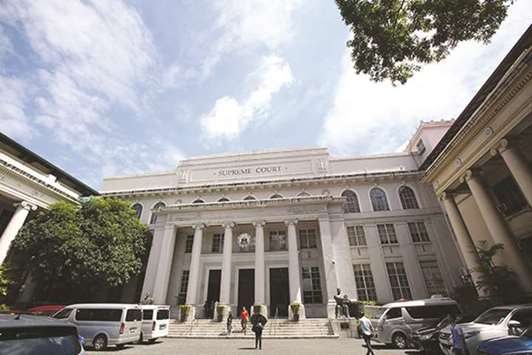The Supreme Court yesterday ordered the government and the Moro Islamic Liberation Front (MILF) to explain the legality and constitutionality of the Bangsamoro Organic Law (BOL).
Following en banc deliberations, the high court ordered the Executive Department to file its comment to the petition filed by the Province of Sulu, represented by Governor Abdusakur Tan 2nd.
The province is assailing the legality of Republic Act 11054 or the BOL that will replace the existing Autonomous Region in Muslim Mindanao (ARMM) with a Bangsamoro Autonomous Region (BAR) possessing more powers.
The court did not issue any order against BOL and the Comelec stopping the implementation of Comelec en banc Resolution No 18-072 and proceeding with the scheduled plebiscite on Jan 21, 2019 for the ratification of RA 11054, despite the petitioners’ claim that the law contravenes the Constitution.
The former government chief negotiator of the peace process with the MILF, Associate Justice Mario Victor Leonen, is the ponente in the case and is tasked to conduct a study and make recommendations.
Named respondents to the case are Executive Secretary Salvador Medialdea, Interior Secretary Eduardo Año, members of the Senate and the House of Representatives, Presidential Adviser on the Peace Process Jesus Dureza and the Bangsamoro Transition Commission and the Moro Islamic Liberation Front.
The petitioner argued that Congress committed grave abuse of discretion, amounting to lack or excess of jurisdiction, in passing the Bangsamoro Law.
In particular, it pointed out that the law violates Section 18 and 19 of Article X of the 1987 Constitution, which authorised the enactment of only one organic act to establish the ARMM.
“Since ARMM is created by Constitutional fiat, Congress, by itself, has absolutely no authority to abolish ARMM. Only through an amendment of the Constitution may ARMM be abolished. This is so, because only the Constitution may create or abolish an autonomous region,” the petition stated.
“Accordingly, when Congress, by enacting RA 11054, effectively abolished ARMM, and established BAR (Bangsamoro Autonomous Region) in its stead, Congress committed an unconstitutional act, an unwarranted infringement of Article X of the Constitution,” it argued.
The petitioner stressed that by establishing a parliamentary form of government in the BAR, it violated the doctrine of separation of powers enshrined in the Constitution.
“The same provision of Bangsamoro Organic Law, also violates Section 18, Article X of the Constitution requiring that the Organic Act of an Autonomous Region shall, among others, define the basic structure of government for the region consisting of the executive department and legislative assembly, both of which shall be elective and representative of the constituent political units,” it pointed out.
It stressed that the “automatic inclusion of the present geographical area known as the ARMM in the newly created BAR and the provision that the provinces and cities of the ARMM shall vote as one geographical area are likewise unconstitutional.”
“The provisions under Section 2(a), Article III on Territorial Jurisdiction and Article XV of RA 11054 on the conduct of the plebiscite do not afford the constituents of the province of Sulu, to the prejudice of their right to suffrage and their right to local autonomy, the option to vote to join or not to join the Bangsamoro Autonomous Region.”
Sulu province sought a temporary restraining order or a writ of preliminary injunction to stop the Bangsamoro law’s implementation.

A facade of the Supreme Court at Padre Faura in Manila.
